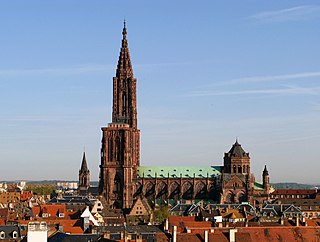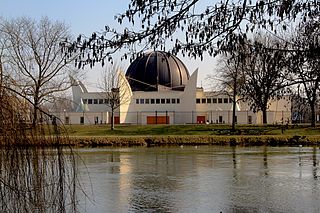
Warith Deen Mohammed, also known as W. Deen Mohammed, Imam W. Deen Muhammad and Imam Warith Deen, was a progressive African American Muslim leader, theologian, philosopher, Muslim revivalist, and Islamic thinker (1975–2008) who disbanded the original Nation of Islam (NOI) in 1976 and transformed it into an orthodox mainstream Islamic movement, the World Community of Al-Islam in the West which later became the American Society of Muslims. He was a son of Elijah Muhammad, the leader of the Nation of Islam from 1933 to 1975.
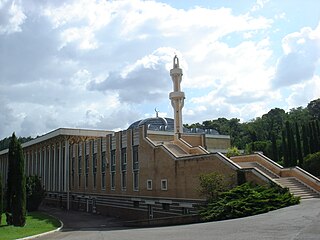
Muslim presence in Italy dates back to the 9th century, when Sicily came under control of the Abbasid Caliphate. There was a large Muslim presence in Italy from 827 until the 12th century. The Norman conquest of Sicily led to a gradual decline of Islam, due to conversions and emigration of Muslims toward Northern Africa. A small Muslim community however survived at least until 1300. Thereafter, until the 20th century, Islam was virtually non-existent in Italy.
The French Council of the Muslim Faith, is a national elected body, to serve as an official interlocutor with the French state in the regulation of Muslim religious activities. It is a non-profit group created on 28 May 2003 by Nicolas Sarkozy and a group of Islamic students who felt they needed better representation in their country.The council consists of 25 CRCMs. From 2008 to 2013 the president of the CFCM is Anouar Kbibech, a CIO of SFR French telecommunications company representing the Rassemblement des musulmans de France.

Ekmeleddin Mehmet İhsanoğlu is a Turkish academic, politician and diplomat who was Secretary-General of the Organisation of Islamic Cooperation (OIC) from 2004 to 2014. He is also an author and editor of academic journals and advocate of intercultural dialogue.
De Moslimexecutieve (Dutch) or L'Exécutif des musulmans de Belgique (French) is the official Muslim interlocutor of the Belgian federal government for the implementation of the July 19, 1974 law recognizing Islam as one of the subsidized religious or secular communities in Belgium according to the law of March 4, 1870.

Islam is the second-largest and fastest-growing religion in Europe. Although the majority of Muslim communities in Europe formed recently, there are centuries-old Muslim societies in the Balkans.
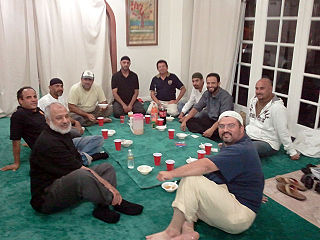
Islam is a minority religion in Mexico. According to the 2010 census conducted by the National Institute of Statistics and Geography (INEGI), there were 2,500 individuals that identified Islam as their religion. The majority are Sunnis and a minority are Shiites or Ahmadiyyas.

There are approximately 100,000 Muslims in Venezuela which make up 0.4 percent of the nation's population. Venezuela has a small but influential Muslim population. Many of them are Arabs of Lebanese, Palestinian, Syrian descent and Turkish.

The statistics for Islam in Chile estimate a total Muslim population of approximately 5000, representing less than 0.02% of the population. There are a number of Islamic organizations in Chile, including the "Muslim Society of Chile and As-Salam Mosque" in Santiago, Chile, "Bilal Mosque"(Mezquita Bilal) in Iquique, and the "Mohammed VI Cultural Center" in Coquimbo, the Community Islam Sunni Chile and the Ahmadiyya Muslim Community Chile, which was established in 2011,

Islam was a widespread religion in what is now Spain and Portugal for nine centuries, beginning with the Umayyad conquest of Hispania and ending with its prohibition by the modern Spanish state in the mid-16th century and the expulsion of the Moriscos in the early 17th century. Although a significant proportion of Moriscos returned to Spain or avoided expulsion through various means, and the decree never affected the country's large enslaved Muslim population, the practice of Islam had faded into obscurity by the 19th century.
Hispanic and Latino American Muslims are Hispanic and Latino Americans who are of the Islamic faith. Hispanic and Latino Americans are an ethnolinguistic group of citizens of the United States with origins in the countries of Latin America or the Iberian peninsula. Islam is a monotheistic and Abrahamic religion articulated by the Quran and by the Sunnah of Muhammad, who is believed to be the messenger to all mankind and Jinns until the Day of Judgement. The Spaniards took the Roman Catholic faith to Latin America, and Roman Catholicism continues to be the largest, but not the only, religious denomination among most Hispanics. As for the Arabs, they took Islam to very few Latin American countries such as Mexico, El Salvador, Guatemala and Colombia.

Islam in Belgium is a minority religion and the second largest religion in the country after Christianity. The exact number of Muslims in Belgium is unknown but various sources estimate that 4.0% to 6.5% of the country's population adheres to Islam. The first registered presence of Islam in Belgium was in 1829, but most Belgian Muslims are first-, second-, or third-generation immigrants that arrived after the 1960s.

According to the Instituto Nacional de Estatística, there were, according to the 1991 census, 9,134 Muslims in Portugal, about 0.1% of the total population, even though the Islamic Community of Lisbon presently points to a number of about 40,000 according to 2011 estimates. The majority of Muslims in the country are Sunnis, followed by approximately 5,000 to 7,000 Sevener Ismā'īlī Shīʻa Muslims. There is also a small number of Ahmadiyya Muslims. Most of the Muslim population originates from the former Portuguese overseas provinces of Guinea-Bissau and Mozambique, most of the latter having their origin in South Asia. Most of the muslims are from Mozambique. The Muslim population in Portugal also have an Islamic school in Palmela, named International School of Palmela which hosts students from around the globe, and brings tourism and a new spotlight to Portugal.
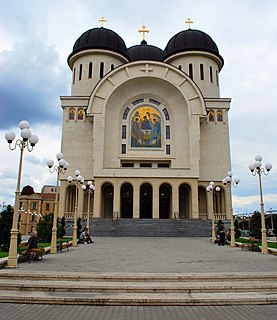
Romania is a secular state, and it has no state religion. Romania is one of the most religious countries in the European Union and a majority of the country's citizens are Christian. The Romanian state officially recognizes 18 religions and denominations. 81.04% of the country's stable population identified as part of the Eastern Orthodox Church in the 2011 census. Other Christian denominations include the Catholic Church, Calvinism (2.99%), and Pentecostal denominations (1.80%). This amounts to approximately 92% of the population identifying as Christian. Romania also has a small but historically significant Muslim minority, concentrated in Northern Dobruja, who are mostly of Crimean Tatar and Turkish ethnicity and number around 44,000 people. According to the 2011 census data, there are also approximately 3,500 Jews, around 21,000 atheists and about 19,000 people not identifying with any religion. The 2011 census numbers are based on a stable population of 20,121,641 people and exclude a portion of about 6% due to unavailable data.

Islamic Commission of Spain is the legitimate representative organ of Islam and Muslims before the citizenship and the Administration for the representation, negotiation, signature and follow-up on the Islam - State agreements adopted in Law 26/1992. The Islamic Commission of Spain meets periodically with representatives of the Administration in the Mixed Paritary Commission; in addition to the conjunctural communications with the Ministry of the Presidency on legislative initiatives, and with the Main Directorate of Religious Affairs of the Ministry of Justice.
A Common Word between Us and You is an open letter, dated 13 October 2007, from leaders of the Islamic religion to leaders of the Christian religion. It calls for peace between Muslims and Christians and tries to work for common ground and understanding between both religions, in line with the Qur'anic command: "Say: 'O People of the Scripture! come to a common word as between us and you: that we worship none but God" and the Biblical commandment to love God, and one's neighbour. In 2008 the initiative was awarded the "Eugen Biser Award", and the "Building Bridges Award" from the UK's Association of Muslim Social Scientists.
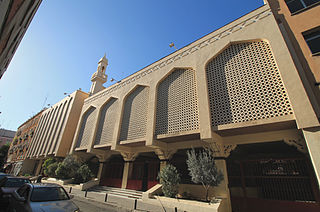
The Madrid Central Mosque or Abu-Bakr Mosque is a building located in Cuatro Caminos neighborhood of Tetuán district. During its construction, its proximity to Estrecho metro station gave birth to the popular name of the Strait Mosque.
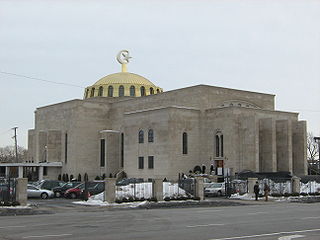
The American Society of Muslims was a predominantly African-American association of Muslims which was the direct descendent of the original Nation of Islam. It was created by Warith Deen Mohammed after he assumed leadership of the Nation of Islam upon the death of his father Elijah Muhammad. Imam W. Deen Mohammed changed the name of the Nation of Islam to the "World Community of Islam in the West" in 1976, then the "American Muslim Mission" in 1981, and finally the "American Society of Muslims".

The Union of Islamic Communities of Spain (UCIDE) is a religious organization with a centered in Madrid. It is supported by Spanish Islamic religious communities. UCIDE is registered in the Registry of Religious Entities at the Spanish Ministry of Justice.
The Islamic Federation of the Canary Islands is a Muslim religious organization that brings together associations and Islamic religious communities around the Canary Islands. Its headquarters is located in the town of Los Cristianos, in the municipality of Arona south of the island of Tenerife (Spain).

